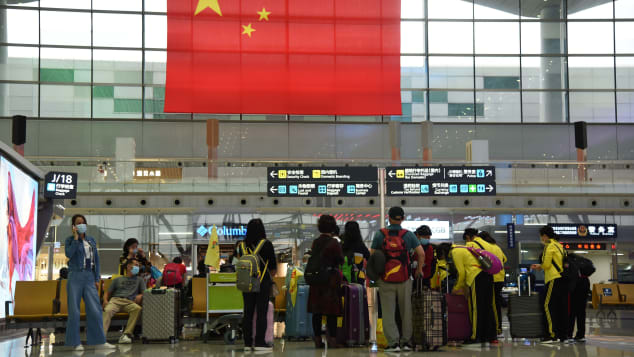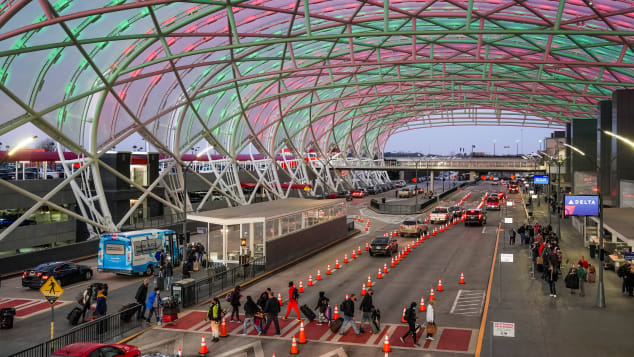(CNN) — Move over, Guangzhou. Georgia’s Hartsfield-Jackson Atlanta International Airport is once again the world’s busiest airport.
The US airport was knocked off its No. 1 perch to the No. 2 slot in passenger volume in 2020 by Guangzhou Baiyun International Airport in China, breaking the Atlanta airport’s 22-year streak in the top slot.
Hartsfield-Jackson Atlanta International Airport was still the busiest passenger airport in the world in 2019. But the pandemic is hitting global air traffic hard in 2020.
But in the 2021 rankings released on Monday by trade association Airports Council International, ATL is back on top, a sign of recovery from 2020’s precipitous plunge in air traffic as the pandemic took hold.
In 2021, the Atlanta airport saw 75.7 million passengers. That figure is up a whopping 76% from 2020 but still nearly 32% below pre-pandemic 2019 figures.
Guangzhou’s airport dropped to No. 8 in 2021, with 40.3 million passengers. Another airport in China, Chengdu’s Shuangliu International Airport, is ninth on the 2021 list, down from No. 3 in 2020.
US airports dominated the passenger traffic rankings in 2021, with eight of the top 10 in the United States.
Dallas/Fort Worth International Airport in Texas was the second-busiest in 2021, with about 62.5 million passengers, and the international airport in Denver, Colorado, ranked third, with 58.8 million passengers.
Chicago’s O’Hare and Los Angeles International rounded out the top five.
The list shows “an encouraging trend of recovery,” Luis Felipe de Oliveira, ACI World’s director general, said in a statement.
“Although we are cautious that recovery could face multiple headwinds, the momentum created by reopening plans by countries could lead to an uptick in travel in the second half of 2022,” de Oliveira said.
In 2021, there were an estimated 4.5 billion passengers globally, according to ACI. That figure represents a nearly 25% increase from 2020 but more than 50% drop from 2019.

Baiyun International Airport in Guangzhou, China, edged out Atlanta’s international airport in 2020 as the world’s busiest. In 2021, Guangzhou’s airport dropped to No. 8.
Tian Jianchuan/Xinhua/ZUMA Press
US and China switch places
Given the much faster recovery of domestic travel compared with international travel, airports that were way down the list of the world’s busiest airports pre-pandemic have leaped up into the top 10.
The airports in Charlotte, North Carolina (No. 6); Orlando, Florida (No. 7); and Las Vegas (No. 10) are new to the top 10 this year. Vacation magnets Orlando and Las Vegas were No. 31 and No. 30 for passenger traffic before the pandemic in 2019.
The United States’ strong showing in the top 10 is a reversal from 2020, when airports in China took seven of the top 10 slots.
China’s dominance in 2020 was because of the early rebound of domestic travel in China. The country still has not reopened to international visitors.
“If we look back on 2020, China was one of the first to come out of the initial waves of the pandemic and it actually almost reached a full recovery by the end of 2020,” said Patrick Lucas, ACI World’s vice president for economics.
But in 2021, domestic traffic in China dropped significantly with renewed lockdowns, while the United States saw a big jump.
The United States has the world’s largest domestic travel market, followed by China.
Airports that routinely landed in the top 10 of the world’s busiest airports list — such as Dubai International, London Heathrow and Paris Charles de Gaulle — have been absent during the pandemic.
“Those markets that had very high proportions of international traffic were of course hurt as a result of all these restrictions and quarantine requirements,” Lucas said.
The significant role of international traffic is also part of the reason that Beijing’s Capital and Shanghai’s Pudong International airports have dropped out of the top 10. Beijing Capital — once routinely No. 2 in passenger traffic — is also seeing its traffic split by the city’s new Daxing International Airport.

Dubai International Airport, which sees a large proportion of international traffic, dropped out of the top 10 busiest airports in 2021. However, it remained No. 1 for international passengers in 2021.
Elena/Adobe Stock
Rolling back restrictions
ACI is advocating a “risk-based approach” to easing travel restrictions, following Covid-19 data, Lucas said.
“Vaccines actually have been the passport to travel, but as we can see now, many major markets are opening up and … a lot of countries have come to realize that curbing travel or imposing travel restrictions actually does not do anything,” he said.
“If anything, it creates even more harm. So meaning that it disrupts the socioeconomic gains of air transport and tourism and so on.”
As it stands, ACI expects total passenger traffic numbers to recover to pre-pandemic levels in 2024.
However, strong domestic markets, including the United States, are expected to recover by 2023. And markets with a high proportion of international traffic aren’t expected to rebound until 2025, Lucas said.
Globally, there are “different forces moving in opposite directions.”
There’s very strong pent-up demand and the lifting of restrictions that have dampened travel versus the rising cost of travel and geopolitical concerns related to what’s happening in Eastern Europe, Lucas said.
But overall, ACI is upbeat. “We have a sense that consumers, passengers, will bite the bullet, so to speak, despite the rise in the cost of travel.”

Hartsfield-Jackson Atlanta International Airport says it is within a two-hour flight of 80% of the US population.
Elijah Nouvelage/Reuters
World’s top 10 busiest airports for passenger traffic in 2021
1. Atlanta (ATL): 75.7 million passengers, up 76% from 2020
2. Dallas/Fort Worth (DFW): 62.5 million passengers, up 59% from 2020
3. Denver (DEN): 58.8 million passengers, up 74% from 2020
4. Chicago O’Hare (ORD): 54 million passengers, up 75% from 2020
5. Los Angeles (LAX): 48 million passengers, up 67% from 2020
6. Charlotte (CLT): 43.3 million passengers, up 59% from 2020
7. Orlando (MCO): 40.4 million passengers, up 87% from 2020
8. Guangzhou (CAN): 40.3 million passengers, down 8% from 2020
9. Chengdu (CTU): 40.1 million passengers, down 1.5% from 2020
10. Las Vegas (LAS): 39.8 million passengers, up 79% from 2020




